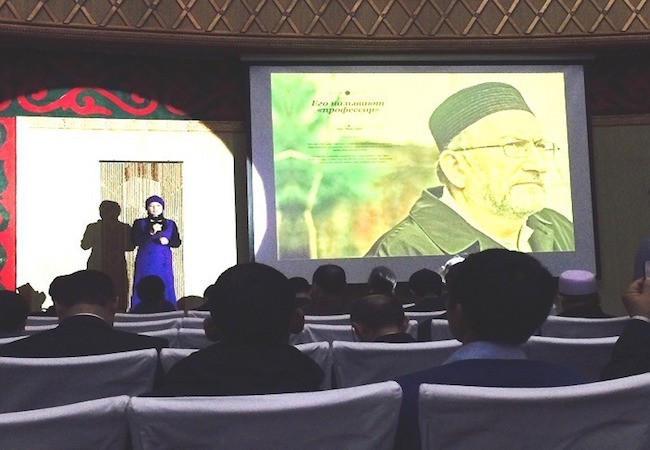
By Asker Sultanov
Kyrgyz Muslims now have a magazine dedicated to their community.
Named “Ummah”, the Arabic word for “community”, the colourful quarterly with an initial circulation of 3,000 was launched February 26 in Bishkek.
“It’s the first Russian-language magazine for [Kyrgyz] Muslims,” editor-in-chief Eliana Satarova told Central Asia Online. “We did our best to make it look as modern as possible. All the articles were contributed by young Kyrgyz intellectuals.”
“We want to show Islam as a religion of peace, enlightenment and progress and instil respect for other religions,” she said. “The magazine’s main purpose is to raise the intellectual level of believers, particularly of youth.”
The magazine meets all modern standards for quality and covers a number of topics from an Islamic perspective.
“Muslims need to unite, not to split up,” Satarova said. “We plan to release the next edition before Ramadan and will distribute it through bookstores and newsstands.”
The first issue was financed by the magazine’s editorial board personally and by the Kyrgyz company Al-Ummah Ltd., she said. “Also, we received free help from designers and authors.”
Yet to continue, the project will require considerable financial input.
“We are looking for potential sponsors,” Satarova said. “We plan to publish the next issue in two languages — Russian and Kyrgyz, to increase circulation … to a regional level, and to deliver it throughout Kyrgyzstan. We want to reach all those goals this year.”
“We differ from other publications because we have an innovative format. There’s nothing like it [nationwide].”
The magazine primarily aims to destroy stereotypes about Islam and Muslims, Roman Veitzel, a Bishkek religious scholar, said after reading the first issue.
“Ummah” provides a wonderful opportunity to persuade readers that Islam is not an aggressive religion looking for conflicts, he said.
“Stories and episodes from the life of the Prophet Muhammad cause ‘Ummah’ readers — from the very first pages — to start abandoning their stereotypes,” Veitzel told Central Asia Online.
“If Muhammad himself treated Christians and members of other ethnic groups well, why should we separate and feel hostile towards one another?” he said.
“‘Ummah’ emphasises family matters,” Veitzel said. “The first issue covers important issues such as the myths and stereotypes regarding the ‘nikah’ marriage ritual, some family problems and their solutions, comments on the ‘kalym’ (bride price) and ‘mahr’ (payment from the groom to the bride) traditions, and so on.”
“I think if this magazine were distributed now to … Kazakhstan, Uzbekistan, Tajikistan and Turkmenistan, it would suit them well too, because it brings up for discussion issues that matter to all of us,” he said.
Zakir Chotayev, deputy director of the State Commission on Religious Affairs, welcomed the debut of the Islamic magazine.
“Such periodicals are badly needed now; the more of them are released, highlighting positive aspects and trends, the better,” he said. “They will help to push our citizens away from the radical, extremist movements that seek to attract new followers through internet propaganda and recruiters. Thanks to these journals, it will be possible to educate yourself and find your place in society in Kyrgyzstan without feeling the need to go abroad.”
“The magazine educates by focusing on the moderate foundations of Islam that are traditional to our society and to [the whole of] Central Asia,” he added.
An Islamic magazine of such a high professional level is urgently needed, Kyrgyz Deputy Supreme Mufti Zamir Rakiyev said.
“We [Kyrgyz Muslims] need to take a look at our economic and political developments from an Islamic point of view,” he told Central Asia Online. “We have been waiting a long time for such a magazine and are very glad to see it.”




